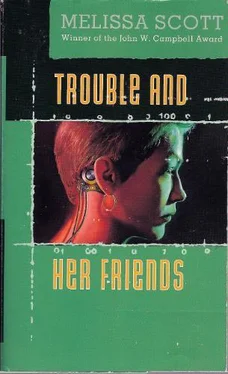*I’m looking for Trouble* Cerise says, and waits.
She gets no answer, Miss Kitty’s icon stands still and silent, and Cerise frowns and takes a step forward. And then she smells it, the scent of rotten meat, the corpse-smell the brainworm uses to signal absolute disaster. Even as she turns to run, the walls fold inward, IC(E) spiking downward. She feels its cold driving at her, lifts a hand to ward off the nearest spine, and its jugged tip scores a deep line along her arm. The brainworm reflects its touch as searing pain and the thin trace of blood ghostly along her icon-arm. There’s no reason for this attack, she’s no danger to Miss Kitty, never has been, has been in fact a good supplier, but there’s no time to form a protest. No time even to reach for an icebreaker, or any of the other programs she carries in her toolkit; this is serious IC(E), deadly serious, and she closes her hand convulsively, triggering the safety. The world dissolves around her, the spikes of the IC(E) fading to static as they touch her skin
and she leaned back in her chair, untangling her fingers from the cord of the safety. The screen in front of her flashed a bright-red icon, and a text message below it: SESSION ABORT. She glared at that—it was an admission of defeat to trigger to the safety, to run away from danger—and then, belatedly, became aware of the faint scent of hot metal rising from the linked machines. She frowned then, and touched the brainbox. The casing was warm, warmer than it should have been. Her frown deepened, and she set the safety aside, touched keys to call up a diagnostic program. The session-abort icon vanished, replaced by a spinning clock-face; a moment later, it, too, disappeared, and the program presented her with a list of the various components and their conditions. Two of the five fuses had tripped in the brainbox, and one had gone in the biotranslator as well. Cerise shivered, even though she’d expected it, and reached for her box of spares. Miss Kitty’s IC(E) had been set to kill—and what the hell the woman thought she was doing, Cerise added silently, transmuting fear to anger, I don’t know. The whole nets have gone crazy—they must have, if anybody’s actually supporting Evans-Tindale. And if Miss Kitty tried to kill me. Though that probably wasn’t personal. She closed her eyes for an instant, remembering the frozen icon and the sudden smell of death. No, probably not personal at all, she decided. If I were abandoning a grey-market space—and I think she must’ve done just that—that’s the way I’d play it. A striking icon to catch people’s attention, and then hair-trigger IC(E) to go after whoever tried to follow me. Or, like Miss Kitty did, whoever showed up first.
She rubbed her arm where the IC(E) had touched her— there were no marks on her skin, just the tingling reminder of a near miss in her nerves—and then began methodically to shut down the system. She couldn’t replace the fuses with the machines running, and she couldn’t go back out onto the nets until the fuses were replaced: no choice, she thought, and swung away from the system. The media wall was still talking at her, the screen now showing a panel of suits discussing the implications of the change. She scowled at them, worked the remote to mute the sound, and only then recognized one of the suited figures as George Aferiat, who had written software for the first dollie-slots and their associated implants, and who had also run a shadow space in the BBS before he’d gotten law. There was nothing more zealous than a convert. She lifted her middle finger to the screen, and turned back to the message board.
It didn’t take a lot of work to retrieve Carlie’s message from the trash—even cheap machines had the option these days, and her system was far from cheap. She glanced at the linked machines—everything was shut down and saved; all she had to do was wait for the chips to cool and trigger the playback. Carlie Held’s voice poured from the little speaker, as perfect as though he himself stood beside her.
“Cerise, Trouble, if either of you’s there, pick up, we’re in deep shit.” There was a pause, and Cerise pictured him standing in the tiny office that served his storefront surgery, the privacy handset swamped in his huge hand. “OK, you’re not there. OK. If you haven’t heard, Evans-Tindale passed— goddamn Congress overrode the veto—which means the worm stays illegal, and Treasury gets to make the law on the nets. I need to talk to you—we all need to talk. Call me as soon as you can.”
Cerise heard the click of the connection breaking, and a red light flashed on the tiny status screen: end of message. She swore under her breath, and reached for her own handset, touched the codes that would connect her with Carlie’s surgery. She heard the beeps as the system routed her call—a local, twelve sharp musical tones, seven for location, three for payment, two for privacy—and then waited as the ring pulsed in her ear. She counted six, and knew Carlie wasn’t answering—wasn’t there—but let it ring a dozen more times, staring at the posturing suits in the media screen, before she finally hung up. Carlie was gone, too.
And that was ridiculous, she told herself. She jabbed buttons again, punching in another number—Arabesque, Rachelle Sirvain in the real world: another local call, just in the next ward, five minutes away by the subway. The phone rang, rang again; she counted ten before she hung up, fighting sudden panic. It was almost as if she was the last one of them left, the last survivor— She shoved that thought away, and punched a third number. This time, the answering machine picked up on the third ring.
“Hi, you’ve reached five-five—”
Cerise broke the connection—Dewildah was gone, too— and punched a final set of codes. In the media screen, the talking suits had disappeared, to be replaced by a head, a serious-looking woman who wore secretarial goggles. The phone rang, rang again, and then a sharply accented voice said, “Hello?”
Cerise let out breath she hadn’t realized she was holding. “Butch. Thank God you’re home.”
“Cerise? Are you all right?”
She could hear the concern in Butch van Liesvelt’s voice, and managed a shaky smile. “Yeah—well, no, Trouble’s gone and there’s all this with Evans-Tindale—”
“Yeah.” There was a little pause, and Cerise could hear in the background the indistinct sounds of someone talking— television, probably, she thought. In the screen, the image changed again, became a pair of lists showing the differences between the Amsterdam Conventions and Evans-Tindale. In one corner of the screen, a much smaller talking head—male this time—babbled away, mouth moving without sound.
“Look,” van Liesvelt said abruptly, “I’m heading over to Marco Polo’s. Carlie called from there, he said he and Max were there already, and that Arabesque was on her way. I was just going to call you and Trouble, I talked to Dewildah already—”
“Trouble’s gone,” Cerise said again.
“Gone? What do you mean, gone?”
“I mean she’s gone. She packed up her stuff and left, I don’t know where she is.” Cerise took another deep breath, fought back the baffled anger. “Or why, exactly, but I think I can guess. I’ll meet you at Marco Polo’s. We can talk there.”
“You sure?” van Liesvelt asked, and Cerise felt her eyes fill up with tears. Of all their oddball group—a half-dozen or so crackers who had dared both the brainworm and the risks of realworld contact—it was van Liesvelt, shambling, physically graceless Butch, who’d done the most to take care of all of them.
“Yeah, I’m sure. I’ll see you at Marco Polo’s.”
She cut the connection before van Liesvelt could ask anything more. She set the handset back on its hook, taking ridiculous care with the placement, waiting until the tears were gone again before she turned her mind to business. She worked the remote again, shutting down the media wall, and grabbed her leather coat off the hook by the door before she could change her mind.
Читать дальше












